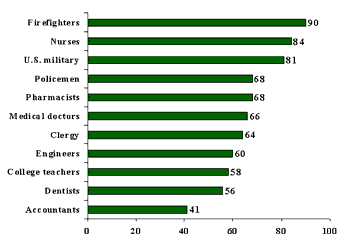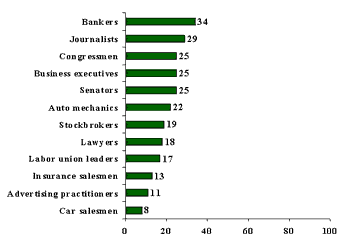GALLUP NEWS SERVICE
PRINCETON, NJ -- In the wake of the Sept. 11 terrorist attacks in the United States, firefighters and other rescue personnel have been widely praised for their heroics as they risked their lives to save others caught in the devastation of the attacks. The annual CNN/USA Today/Gallup Poll ranking of the honesty and ethics of professions reflects this respect, as firefighters rank first among people of different professions for their honesty and integrity, with 90% of Americans rating them "high" or "very high" on these characteristics.
Close behind in the ratings are nurses and members of the military, with more than eight in 10 Americans giving them high ratings on their honesty and ethics. The police, pharmacists, medical doctors and the clergy are bunched together in fourth place, with about two-thirds of Americans giving each group a high rating. More than half of Americans also give high ratings to engineers, college teachers and dentists.
| Please tell me how you would rate the honesty
and ethical standards of people in these different fields -- very
high, high, average, low, or very low? % Saying "very high" or "high" |
 |
| November 26-27, 2001 |
| Please tell me how you would rate the honesty
and ethical standards of people in these different fields -- very
high, high, average, low, or very low? % Saying "very high" or "high" |
 |
| November 26-27, 2001 |
At the lowest end of the scale are car salesmen, the only group given a low or very low rating on honesty and ethics by a majority of Americans. Other groups receiving low ratings from at least three of 10 Americans are lawyers, insurance salesmen and labor union leaders.
Pharmacists vs. the Clergy and Police
The annual Gallup Poll rating of professions was conducted this year on Nov. 26-27. This is the first year when Americans were asked to rate firefighters and members of the military, and only the third year nurses were rated. Nurses came in first the past two years, given high ratings by 73% and 79% of Americans in each of the respective years. They supplanted the longest-winning group, pharmacists, who had come in first every year from 1988 to 1998. In 1981, 1983 and 1985, the clergy edged out the pharmacists by a few percentage points, but starting in 1988 -- in the wake of several scandals involving televangelists -- ratings for the clergy fell several percentage points. For the next decade, an average of about 65% of Americans each year rated pharmacists as high on honesty and ethics, compared with an average of about 56% for the clergy. In the latest poll, pharmacists still outrank the clergy, but by a somewhat narrower margin of 68% to 64%.
The police have experienced an improvement in their ratings in the past several years. In 1995, the year of the O.J. Simpson trial, only 41% gave the police a high rating, the lowest rating in a decade. The following year the percentage jumped to 49%, and by last year it had climbed to 55%, the highest ever. This year, 68% of Americans give the police high ratings on their honesty and ethics, the largest jump of any group measured in both years. The increase is no doubt related to the general "rally effect" for the uniformed services following the Sept. 11 terrorist attacks.
Two professions that did well last year but were not included this year (they are scheduled for inclusion next year) are veterinarians and grade school/high school teachers, each given high ratings by more than six in 10 Americans in 2000. In the past two years, the grade school and high school teachers outranked college teachers by an average of four percentage points.
Car Salesmen
Of the 23 groups rated in the poll, 13 receive high or very high ratings from less than half the public. However, for 12 of these 13 groups, most of the ratings that are not "high" are nevertheless "average" -- so that all but one group are rated "average" or better by a majority of the public. Fifty-two percent of Americans rate car salesmen either "low" (39%) or "very low" (13%) on honesty and ethics, the largest number by far for any group.
Four groups receive low or very low ratings from about three in 10 Americans: lawyers (31%), insurance salesmen (30%), labor union leaders (30%) and advertising practitioners (27%).
Survey Methods
The results reported here are based on telephone interviews with a randomly selected national sample of 1,005 adults, 18 years and older, conducted Nov. 26-27, 2001. For results based on this sample, one can say with 95 percent confidence that the maximum error attributable to sampling and other random effects is plus or minus 3 percentage points. In addition to sampling error, question wording and practical difficulties in conducting surveys can introduce error or bias into the findings of public opinion polls.
Please tell me how you would rate the honesty and ethical standards of people in these different fields -- very high, high, average, low, or very low? First, ... Next, ...[RANDOM ORDER]
PERCENTAGE SAYING "VERY HIGH" / "HIGH"
|
‘77 |
‘81 |
‘83 |
‘85 |
‘88 |
‘90 |
‘91 |
‘92 |
‘93 |
‘94 |
‘95 |
‘96 |
‘97 |
‘98 |
‘99 |
‘00 |
‘01 |
|
|
Firefighters |
-- |
-- |
-- |
-- |
-- |
-- |
-- |
-- |
-- |
-- |
-- |
-- |
-- |
-- |
-- |
-- |
90 |
|
Nurses |
-- |
-- |
-- |
-- |
-- |
-- |
-- |
-- |
-- |
-- |
-- |
-- |
-- |
-- |
73 |
79 |
84 |
|
Members of U.S. military |
-- |
-- |
-- |
-- |
-- |
-- |
-- |
-- |
-- |
-- |
-- |
-- |
-- |
-- |
-- |
-- |
81 |
|
Policemen |
37 |
44 |
41 |
47 |
47 |
49 |
43 |
42 |
50 |
46 |
41 |
49 |
49 |
49 |
52 |
55 |
68 |
|
Druggists, pharmacists |
-- |
59 |
61 |
65 |
66 |
62 |
60 |
66 |
65 |
62 |
66 |
64 |
69 |
64 |
69 |
67 |
68 |
|
Medical doctors |
51 |
50 |
52 |
58 |
53 |
52 |
54 |
52 |
51 |
47 |
54 |
55 |
56 |
57 |
58 |
63 |
66 |
|
Clergy |
61 |
63 |
64 |
67 |
60 |
55 |
57 |
54 |
53 |
54 |
56 |
56 |
59 |
59 |
56 |
60 |
64 |
|
Engineers |
46 |
48 |
45 |
53 |
48 |
50 |
45 |
48 |
49 |
49 |
53 |
48 |
49 |
50 |
50 |
56 |
60 |
|
College teachers |
46 |
45 |
47 |
53 |
54 |
51 |
45 |
50 |
52 |
50 |
52 |
56 |
55 |
53 |
52 |
59 |
58 |
|
Dentists |
-- |
52 |
51 |
56 |
51 |
52 |
50 |
50 |
50 |
51 |
54 |
53 |
54 |
53 |
52 |
58 |
56 |
|
Accountants |
-- |
-- |
-- |
-- |
-- |
-- |
-- |
-- |
-- |
-- |
-- |
-- |
-- |
-- |
-- |
38 |
41 |
|
Bankers |
39 |
39 |
38 |
38 |
26 |
32 |
30 |
27 |
28 |
27 |
27 |
26 |
34 |
30 |
30 |
37 |
34 |
|
Journalists |
33 |
32 |
28 |
31 |
23 |
30 |
26 |
27 |
26 |
20 |
23 |
23 |
23 |
22 |
24 |
21 |
29 |
|
Congressmen |
16 |
15 |
14 |
20 |
16 |
20 |
19 |
11 |
14 |
10 |
10 |
14 |
12 |
17 |
11 |
21 |
25 |
|
Business executives |
19 |
19 |
18 |
23 |
16 |
25 |
21 |
18 |
20 |
22 |
19 |
17 |
20 |
21 |
23 |
23 |
25 |
|
Senators |
19 |
20 |
16 |
23 |
19 |
24 |
19 |
13 |
18 |
12 |
12 |
15 |
14 |
19 |
17 |
24 |
25 |
|
Auto mechanics |
-- |
-- |
-- |
-- |
-- |
-- |
-- |
-- |
-- |
-- |
-- |
-- |
-- |
-- |
24 |
22 |
22 |
|
Stockbrokers |
-- |
21 |
19 |
20 |
13 |
14 |
14 |
13 |
13 |
15 |
16 |
15 |
18 |
19 |
16 |
19 |
19 |
|
Lawyers |
26 |
25 |
24 |
27 |
18 |
22 |
22 |
18 |
16 |
17 |
16 |
17 |
15 |
14 |
13 |
17 |
18 |
|
Labor union leaders |
13 |
14 |
12 |
13 |
14 |
15 |
13 |
14 |
14 |
14 |
14 |
16 |
15 |
15 |
17 |
17 |
17 |
|
Insurance salesmen |
15 |
11 |
13 |
10 |
10 |
13 |
14 |
9 |
10 |
9 |
11 |
11 |
12 |
11 |
10 |
10 |
13 |
|
Advertising practitioners |
10 |
9 |
9 |
12 |
7 |
12 |
12 |
10 |
8 |
12 |
10 |
11 |
12 |
10 |
9 |
10 |
11 |
|
Car salesmen |
8 |
6 |
6 |
5 |
6 |
6 |
8 |
5 |
6 |
6 |
5 |
8 |
8 |
5 |
8 |
7 |
8 |

